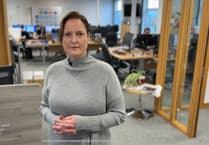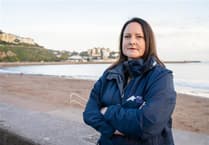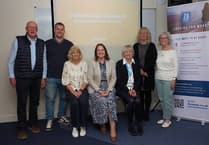‘If you can see a long way on Dartmoor, it’s going to rain. If you can’t, it already is.’
I should have remembered that saying before leaving my car recently in Princetown, writes Andrew Cooper.
At 435 metres above sea level, this is not only Devon’s highest village, but also one of the loftiest in the entire country.
So, it is not surprising that rainfall here is measured not by the millimetre as in metres.
To be more precise over two metres of the wet stuff every year. But this is not the first time I have been soaked. Thankfully not a regular habit, apart from when filming wildlife.
An early filming trip took me to a secret location led by an expert.
After several hours following eerily quiet, narrow lanes, the weather went from bad to worse.
Drizzle gave way to thick fog. Crawling at a snail’s pace in the descending dark, a welcome sight appeared out of the gloom, a large well-lit old coaching inn.
By the sounds coming from inside, it was also open. But the front door was locked.
Feeling my way around to the back I came across a large open fronted shed, lit by what appeared to be old oil lamps.
Inside a line of horses were contentedly munching on net bags stuffed full of hay. Across the straw strewn yard, a stable door seemed to be a rear entrance to the inn. But that too was locked.
Using a large wrought iron knocker, after a few seconds the top section swung open to reveal a time warp. Cavaliers and roundheads were boisterously feasting at a long table.
Then a young lady, dressed as a 17th century serving wench balancing a tray with two large tankards, told me politely but firmly that this was a private party.
And unless I was part of the BBC crew I could enter.
After explaining that I was filming for BBC television, I was led through the hearty throng to a table with more casually dressed diners.
Unwittingly, I had gate crashed an end of shoot party for a period drama. The producer promptly organised a meal for me and when he learnt I had no accommodation, his production assistant promptly booked me into a local bed and breakfast. Now that is what I call landing on my feet.
The following day was even better, although still wet with passing showers, my expert set me up in a canvas hide by a wide fast flowing river.
The following dawn I was ready, downwind, with film camera and tripod, when I heard the distinctive whistle of an otter. Then two, then three.
This was the family’s favoured place to wait and play while their mother caught breakfast.
Some wild creatures, like wildlife filmmakers, regularly get drenched for a living.
Pictured: Devon is a stronghold for the otter.





Comments
This article has no comments yet. Be the first to leave a comment.